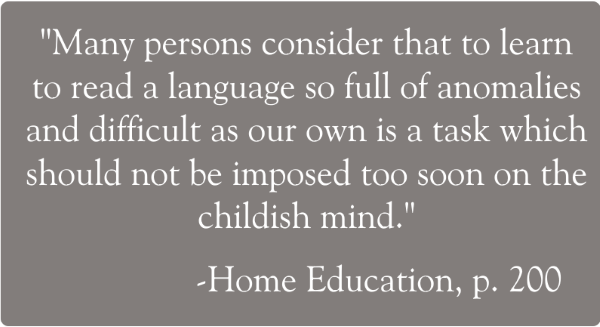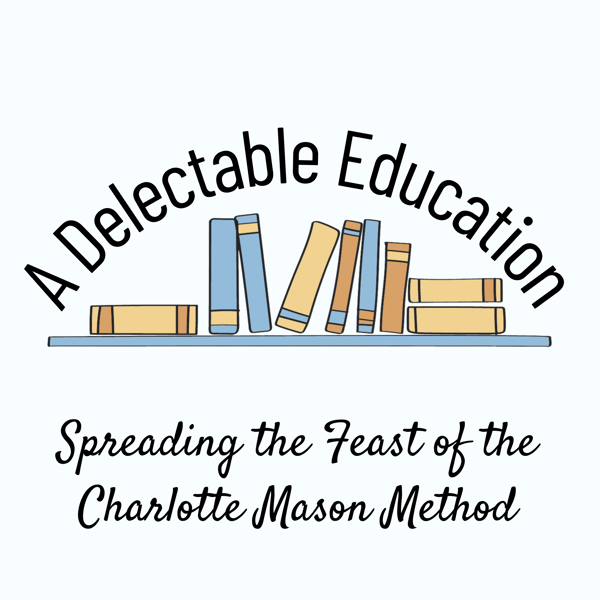Episode 46: Reading
A Delectable Education Charlotte Mason Podcast
Nicole Williams
5 • 1K Ratings
🗓️ 16 September 2016
⏱️ 45 minutes
🧾️ Download transcript
Summary
This week's Charlotte Mason podcast focuses on the all-important task of teaching our children to read. No other subject holds such promise and so many anxieties for the teacher who embarks on teaching this fundamental skill. The ladies share their own experiences and what Mason had to say to help us in the reading lesson.
Listen Now:
If you are seeing this message, please make sure you are using the most current version of your web browser: Internet Explorer 9, Firefox, Chrome


"But, as a matter of fact, few of us can recollect how or when we learned to read: for all we know it came by nature." (Vol. 1, p. 200)
"Probably that vague whole which we call 'Education' offers no more difficult and repellent task than that to which every little child is set down--the task of learning to read. We realize the labor of it when some grown man makes a heroic effort to remedy shameful ignorance, but we forget how contrary to nature it is for a little child to occupy himself with dreary hieroglyphics--all so dreadfully alike!--when the world is teeming with interesting objects which he is agog to know." (Vol. 1, p. 214)
"'What a snail's progress!' you are inclined to say. Not so slow, after all: a child will thus learn, without appreciable labour, from 2-3,000 words in the course of a year; in other words, he will learn to read, for the mastery of this number of words will carry him with comfort through most of the books that fall in his way. Now, compare this steady progress and constant interest and liveliness of such lessons with the deadly weariness of the ordinary reading lesson. The child blunders through a page or two in the dreary monotone without expression, with imperfect enunciation. He comes to a word he does not know, and he spells it; that throws no light on the subject, and he is told the word; he repeats it, but as he has made no mental effort to secure the word, the next time he meets with it the same process is gone through. The reading lesson for that day comes to an end. The pupil has been miserably bored, and has not acquired one new word. Eventually, he learns to read, somehow, by mere dint of repetition; but consider what an abuse of his intelligence is a system of teaching which makes him undergo daily labour with little or no result, and gives him a distaste for books before he has learned to use them." (Vol. 1, pp. 206-207)
"We must remember the natural inertness of a child's mind; give him the habit of being read to, and he will steadily shirk the labour of reading for himself; indeed, we all like to be spoon-fed with our intellectual meat, or we should read and think more for ourselves and be less eager to run after lectures." (Vol. 1, p. 228)
"He should have practice, too, in reading aloud [from the books] he is using for his term's work. These should include a good deal of poetry, to accustom him to the delicate rendering of shades of meaning, and especially to make him aware that words are beautiful in themselves, that they are a source of pleasure, and are worthy of our honour; and that a beautiful word deserves to be beautifully said, with a certain roundness of tone and precision of utterance." (Vol. 1, p. 227)
"The attention of his teachers should be fixed on two points--that he acquires the habit of reading, and that he does not fall into slipshod habits of reading." (Vol. 1, p. 226)

If you would like to study along with us, here are some passages from The Home Education Series and other Parent's Review articles that would be helpful for this episode's topic. You may also read the series online here, or get the free Kindle version from Fisher Academy.
Home Education, pp. 199-222)

Better Late Than Early, Raymond Moore
Reading-Literature Series
Thirty Million Words, Dana Suskind
(Contains affiliate links)

Montessori Small Moveable Alphabet
Reading-Literature series on MainLesson.com
Transcript
Click on a timestamp to play from that location
| 0:00.0 | A Delectable Education Podcast is sponsored by Truth Quest History. |
| 0:04.8 | We at Truth Quest History see the subject of history a little differently. |
| 0:08.5 | Not as a litany of dates and deeds, but that past kings, artists, philosophers, scientists, warriors, and everyday folks act upon their beliefs. |
| 0:18.0 | Since God is central in history as its initiator, an establishment of all truth, how man has responded to that truth has shaped history. |
| 0:26.0 | Throughout Truth Quest history, the students learn of the wars and paintings, the scientific |
| 0:31.8 | discoveries, and the social issues, but in the context of unchanging |
| 0:35.8 | truth. This multiple award-winning curriculum provides parents with the daily means to |
| 0:40.9 | harness history study as dramatic proof of truth for families, governments, |
| 0:46.5 | economies, nations for eternity through the pages of living books and resulting inspiring rich discussions. |
| 0:55.0 | Visit truthquest history.com to see samples and reviews of this award winning history curriculum. I'm going to be here. Thanks for joining us on a delectable education, the podcast that spreads the |
| 1:36.5 | feast of the Charlotte Mason method. I'm Emily Kaiser and I'm here with |
| 1:40.3 | Nicole Williams and Liz Khetro. Today on episode 46 of the podcast we're going to be discussing reading lessons, how to teach a child to read Mason's way. |
| 1:51.0 | Now this is one of those very few references I just know off of the top of my |
| 1:55.4 | head. I'm not a number person but I know that if you start on page 199 of home education |
| 2:01.1 | you can read what Charlotte Mason said about teaching reading. |
| 2:05.0 | Let's quickly review where this falls in the process of language acquisition. |
| 2:09.0 | First we hear language and then we learn to speak language and school lessons that is narration. |
| 2:17.0 | And then around six, Mason believe that children should start to learn to read language through their eyes. |
| 2:25.0 | I don't well remember learning to read, but I do remember two specific things. |
| 2:29.0 | I remember my mom switching me schools because I was having problems with a teacher with regard to reading |
| 2:38.1 | and I don't know what those problems were. I just know that that was the impetus behind that. |
| 2:43.0 | And then I remember in the third grade having a parent-teacher conference where the teacher was telling my mom that I was having trouble with reading. |
... |
Please login to see the full transcript.
Disclaimer: The podcast and artwork embedded on this page are from Nicole Williams, and are the property of its owner and not affiliated with or endorsed by Tapesearch.
Generated transcripts are the property of Nicole Williams and are distributed freely under the Fair Use doctrine. Transcripts generated by Tapesearch are not guaranteed to be accurate.
Copyright © Tapesearch 2025.

